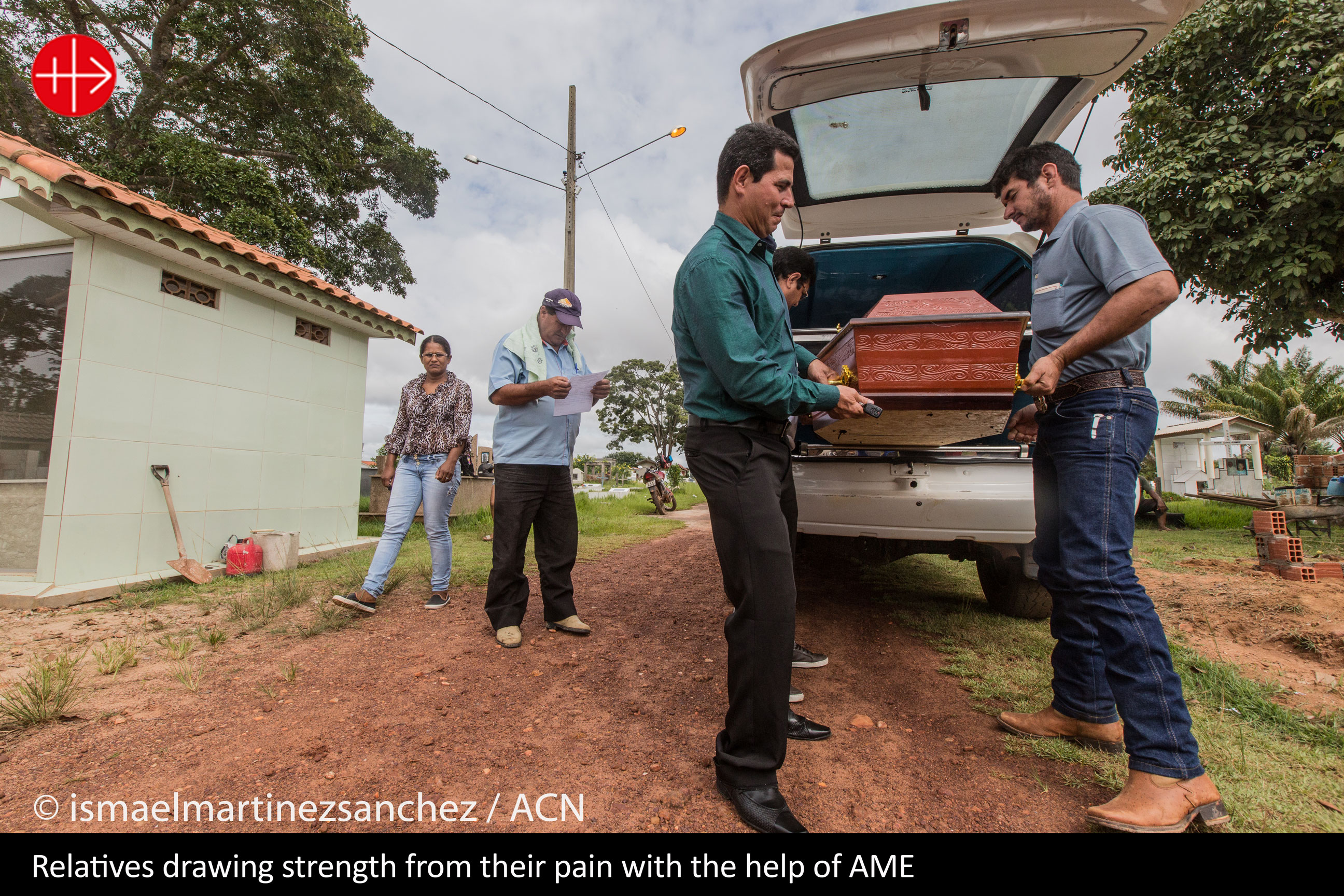BRAZIL
“Now and at the hour of our death”
The month of November is devoted in particular to prayers for the deceased. What was supposed to be a work of mercy in the Amazonas region of Brazil became nothing more than a means of exploitation before the church took the initiative? The pontifical foundation Aid to the Church in Need (ACN) helped achieve this transformation.
The diocese of Juína is located in the state of Mato Grosso in the central part of western Brazil, an area that is part of the Amazonas region. In this region, a young mother and her small daughter died in an automobile accident. The young woman was survived by a widower and two children. After the diocese of Juína became aware of the family’s situation, it founded a community funeral home called AME (Associação Ministério de Esperança), which rendered its first service to this family. Its staff of volunteers may not have had any professional training, but they were more than willing to help the family. Some of the team comforted and supported the widower. Others made arrangements for the coffins. No structures were in place, which made the task quite difficult. However, the entire process was fuelled by sympathy. Since the family did not have enough money, AME paid for the funeral expenses. The widower was a devout man who later joined the team as a volunteer.
People lost their land to be able to bury their family members
Before AME was founded, there was only one funeral home in Juína and it charged exorbitant prices for its services. As witnessed by people who are close to the families as well as by Bishop Neri José Tondello of Juína, “people lost all their worldly goods, even their land, when they had to bury their family members. This was exacerbated by poor manners and a lack of professionalism.” The first bishop of the diocese, Franco Dalla Valle, had the idea of founding a new funeral home. He understood that measures needed to be taken to help the people, not only during their lifetime but also at the hour of their death, so he decided to found a community funeral home. The funeral expenses were not only supposed to be kept as low as possible through the work of volunteers, but family members were to be treated humanely and those who were mourning their dead were to be offered the solace of Christian hope. Unfortunately, the hour of his own death came while he was still developing the project: Bishop Franco passed away on 2 August 2007 before his dream could be realised. However, this project did not die with him thanks to the willingness of volunteers. When Bishop Neri José took over the diocese of Juína, one of his main goals was to continue the projects initiated by his predecessor. With the support of the international Catholic pastoral charity Aid to the Church in Need, the funeral home was one of the first projects to be realised. And so AME was founded.
Volunteers were harassed
At the beginning, volunteers divided up the tasks that needed to be done amongst themselves. The association took care of poor families, the destitute, indigenous communities, etc. with brotherly love and consideration. Word gradually began to spread about the excellent work of AME – not only in Junía but also in the neighbouring cities, which began to use the services of the funeral home as well. Even people who had sufficient funds decided to use AME because of the emphasis placed by the association on human dignity. Those who had been enriching themselves for years on the pain of others far beyond that which could be considered fair reacted with great displeasure. At the beginning, things were anything but simple. Some of the volunteers were harassed. However, they never stopped believing in the project.
Giving families hope and comfort
AME was not only founded for professional reasons. Rather, it was motivated by the desire to bring peace and the hope of resurrection to those keeping vigil by a friend or family member. The premises of the funeral home consist of one room in which mourners can stay overnight, a common room for family members and a dining room. Even the basic funeral equipment can be used free of charge. Bishop Franco’s idea was so successful that it has been adopted by other cities such as Aripuanã and Colniza.
The Asociación Ministerio de Esperanza is a work of mercy. The benefactors of Aid to the Church in Need played an important role in its foundation by funding the restoration of the building in which AME is located. Aid to the Church in Need also bought a van to transport the coffins. The work of many people has made it possible to replace what was once exploitation with the hope and receptivity of those who volunteer their time to carry out this work with dedication and brotherly love.
Aid to the Church in Need continues to support the diocese of Juína in Brazil, particularly in the areas of youth work and the pastoral care of the indigenous population. Nine different ethnic groups live in Juína, spread across 150 small villages.





